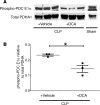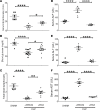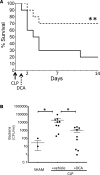Pyruvate dehydrogenase complex stimulation promotes immunometabolic homeostasis and sepsis survival
- PMID: 30089711
- PMCID: PMC6129136
- DOI: 10.1172/jci.insight.99292
Pyruvate dehydrogenase complex stimulation promotes immunometabolic homeostasis and sepsis survival
Abstract
Limited understanding of the mechanisms responsible for life-threatening organ and immune failure hampers scientists' ability to design sepsis treatments. Pyruvate dehydrogenase kinase 1 (PDK1) is persistently expressed in immune-tolerant monocytes of septic mice and humans and deactivates mitochondrial pyruvate dehydrogenase complex (PDC), the gate-keeping enzyme for glucose oxidation. Here, we show that targeting PDK with its prototypic inhibitor dichloroacetate (DCA) reactivates PDC; increases mitochondrial oxidative bioenergetics in isolated hepatocytes and splenocytes; promotes vascular, immune, and organ homeostasis; accelerates bacterial clearance; and increases survival. These results indicate that the PDC/PDK axis is a druggable mitochondrial target for promoting immunometabolic and organ homeostasis during sepsis.
Keywords: Glucose metabolism; Homeostasis; Immunology; Infectious disease; Mitochondria.
Conflict of interest statement
Figures









References
Publication types
MeSH terms
Substances
Grants and funding
LinkOut - more resources
Full Text Sources
Other Literature Sources
Medical
Miscellaneous

